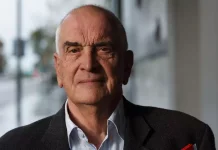Getting mad at the government is not the right way to respond to the devastation of Hurricane Dorian, the Bishop of the Bahamas and Turks & Caicos Islands said this week. In the wake of mounting criticism by Bahamians over Prime Minister Hubert Minnis government’s response to the devastation caused by the category 5 hurricane that leveled much of Grand Bahama and the Abacos the Rt. Rev. Laish Boyd called for patience and charity.
“The prime minister, the Cabinet, the government and all its departments and agencies have been stretched beyond their limits over the last two weeks,” Bishop Boyd said in a statement released to the media on 18 Sept 2019. “I think that they have done well, all things considered, and are to be commended. I repeat, our best efforts could not have prepared us for this event. Some things did not go smoothly.”
“There are some things that we need to do better but this is a natural disaster that is much bigger than any to which we are accustomed, so what do you expect? We will learn from this experience – protocols, regimes and procedures will be expanded and others created. We will grow because of this – but all experiences cause people to do that,” the bishop said.
Dorian struck the Abacos on 1 Sept 2019 with maximum sustained winds of 185 mph. It passed over Grand Bahama, stalling just north of the island for 24 hours. Most structures on the islands were destroyed and at least 70,000 people left homeless. The death toll remains incomplete but over a 1000 people are listed as missing. The Bahamian government was unable to meet the immediate needs of many of those living in shelters, and called upon the US government and charities for assistance, prompting anger from some Bahamians.
The Bishop said “while some things have gone wrong, natural disasters are messy and things cannot be resolved at the speed and ease of the ideal.”
“Many of the delays in rescuing and recovering could not be avoided in the circumstance and given our standing local resources. Human dislocation and evacuation are tedious and harrowing in the best of circumstances. Patience and understanding are key in this scenario.
“Abaco, Grand Bahama and the whole Bahamas will not be the same for a long time. There are years of healing, settling and resettling, rebuilding and redevelopment before us. Entire local economies have to be rebuilt.
“However, right now the pain and anguish and suffering are great, for all of us. Blaming the prime minister – any prime minister – is not helpful. Lambasting the government – any government – is of no value. We need to come together, not be divided. Animosity and competition, fighting among ourselves and being at odds do not heal.”
He said: “Let us work harder on being positive. I admit that everything is not perfect and that there is always room for improvements. However, we need to create a national atmosphere that is more positive and encouraging. Interpreting every occurrence in a negative or conspiratorial light does not ease burdens.
“Tell the stories of survival not as criticisms, but as what they are: triumph in the face of great odds. Tell the stories of those who overcame great odds. I believe that the Bahamas will overcome this.
“There are people of all ages who have been traumatized severely. We will all need ongoing love, counseling and support. But, a negative atmosphere will not help anyone to heal. We need to use this time to speak encouragement and healing and well-being, to calm and to reassure the broken and the uncertain.
“I call on the users of social media and the members of the press to help to ease the national angst with more positive stories and outlooks and with more love and cheerfulness. Acts of kindness and a kind atmosphere do more to cause healing than the discussion and negativity that is so prevalent in some quarters.”
“The fact of the matter is that as a country we are not accustomed to events of this magnitude. We have no experience with events of this magnitude. Even countries much larger than us find it difficult to cope with a storm such and its aftermath. Our best efforts alone would not be sufficient. That is why we are so grateful for the United States, the United Kingdom, Jamaica, Trinidad and Tobago, Holland, Canada and other countries. Our best systems, infrastructure, efforts and resources could never do it alone,” Bishop Boyd said.










